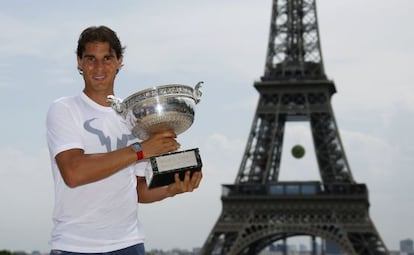Rafa Nadal: ¡°I¡¯d rather die being brave¡±
The world number one discusses tennis, tears and tattoos after his historic ninth Roland Garros win


Rafael Nadal is now a tennis player with a target: before the 28-year-old retires, he could reach or even surpass the 17 Grand Slam titles won by Roger Federer, the current record holder.
After his ninth French Open victory on Sunday, the Mallorcan has notched up 14 major tournament victories, the same as the the legendary Pete Sampras, and now has his sights set on this year¡¯s Wimbledon, which begins on June 23.
The day after his historic Roland Garros win, Nadal sat down with EL PA?S to talk about tennis, tears, pain and tattoos.
Question. You¡¯ve spent the last decade winning majors. What do you miss about the Nadal of 2005, and what added value would that rookie bring to the veteran?
Answer. I would like to have the build I had back then, and the extra energy that you have when you are so young. At the 2005 finals I felt like I could keep running for 10 straight hours. Over the years, even though most of the time I feel physically fine, you don¡¯t get that feeling as often, that sense of extra energy. Today¡¯s Nadal would make the younger one rectify a few things: he would make him train his serve a different way, be aggressive in a different way ... but the things I didn¡¯t do then may have made me stronger in other ways. You never know where success lies. The truth is, I am where I am, and I could never have dreamed of something like this. Did I make mistakes? Yes, but there were more good decisions than mistakes. I cannot have too many regrets.
When you work towards something and you deserve it, the logical thing is for you to eventually achieve it¡±
Q. Many say that Djokovic has a stare that strikes awe in his rivals. What is it about Djokovic that impresses you?
A. Throughout my career, when a rival and I have taken each other to the limit, at the decisive moment, if I feel good, then I am able to play with the right determination. I think that he, or they, may feel that I have made the right decision with the right determination at the decisive moment. It¡¯s doing what you feel you have to do, and for your head to let you do it, without letting your nerves stop you from doing the opposite of what you believe you have to do.
Q. For instance?
A. For instance, before Djokovic¡¯s double fault at match point, I had already decided to hit a high cross shot and then a parallel forehand. I had already made that decision before he missed. I told myself: ¡°The time is now; I am tired, I must play.¡± My inner logic was: ¡°If I miss, it will be my miss. If I end up not winning this game, I must not think that I haven¡¯t been brave. I would rather die being brave.¡±
Q. You ended up winning the trophy, but injured a foot and your back, and suffered a scare when your knee gave way at one point. Why are you risking trying to play on the grass at Wimbledon?
A. First, because I made the commitment, and I don¡¯t like to break my commitments. Second, I¡¯ve been playing poorly at Wimbledon for two years. It¡¯s true that Toni [Nadal, his uncle and trainer] says it¡¯s an attitude thing. I have the utmost respect for his opinion, but at the same time I say that after losing there in 2012 I did not play another game in seven-and-a-half months because I was a mess, and in 2013 my knee was not doing well. I played on painkillers the entire year, getting shots of Voltaren [a nonsteroidal anti-inflammatory drug] every day. The grass demanded a mental and physical effort from me that I was unable to bear. I remember I went to an exhibition game against Nishikori as training, and I did not feel well. Seeing myself helpless, seeing I could not find something to motivate me, prevented me from making the effort.
If I miss, it will be my miss. If I end up not winning this game, I must not think I haven¡¯t been brave¡±
Q. Did you become afraid of the grass?
A. It¡¯s just that my knee was hurting. Not fear. Pain. It¡¯s not a matter of fear. I am not a fearful person, but when it hurts, it hurts, and when there¡¯s a limitation, there¡¯s a limitation. I am going to Halle because I want to try to play well on the grass again. After that, if my back does not respond or if my knee acts up ... that¡¯s the way it will be, I will have tried.
Q. ¡°Ever tried. Ever failed. No matter. Try again. Fail again. Fail better.¡± This message is tattooed on the arm of Stanislas Wawrinka, who beat you at the Australian Open. What would your own tattoo say?
A. I am not into tattoos.
Q. A memory of Sampras?
A. When I was 12, I saw him play live in Stuttgart ¡ I mostly remember his games against Agassi. I remember a US Open final with a very long point.
Q. You said you cried when Roger Federer won Roland Garros in 2009, the year you went out to Robin S?derling, your only defeat at the tournament ...
Q. I was moved.
Q. Will you cry if Djokovic wins?
A. I don¡¯t know. As the years go by you see things a bit differently. It doesn¡¯t take a lot to make me cry. I often cry at the movies, sometimes with videos, and with things that move me about sports. I have a good relationship with Federer. I am one of those people who believes that when you work towards something and you deserve it, the logical thing is for you to eventually achieve it. I don¡¯t know whether I will be moved to tears by Djokovic. It will depend on the situation, the feelings and the emotions of the moment. That kind of thing cannot be predicted. Either it happens or it doesn¡¯t.
Q. YouTube is full of videos of your best points. Do you also get emotional about them?
Today¡¯s Nadal would make the younger one rectify a few things¡±
A. I¡¯m more likely to watch matches, technical things, than summaries of that sort. But some I have seen are really nice, very moving, they are really well done. One of them gave me some energy back when I was recovering from my injury [the knee, in 2012]. It was pretty long, 14 minutes. It reviewed the stages I¡¯d been through during the injury, and covered the comeback. It was very nice.
Q. You hate being asked whether you will be able to equal or surpass Federer¡¯s 17 majors.
A. I don¡¯t hate it, I simply do not talk about it.
Q. But when do you know that you are no longer going to win any more games?
A. I¡¯m not sure it is possible to know that. You realize because of the years that have passed, the moments and the situations in which you have known whether you were ready or not. A month and a half ago I was not ready for what happened on Sunday. On Sunday I was ready. It was the right time. When I feel that I am not ready for three months, six months, a year, a year and a half ... then I will begin to see that there¡¯s no, no ...
Q. That there¡¯s nothing more ...
A. That it¡¯s more complicated. Federer, who hasn¡¯t won a Grand Slam in the last few years, is still there, isn¡¯t he? So we¡¯ll see. Can he win at Wimbledon? Yes. But your options start to narrow when you¡¯ve spent some time without competing well against the good ones.
Q. Aren¡¯t you surprised that Federer has not found solutions to beat you?
A. In the end, you look for solutions but you have your playing pattern. Can I play very aggressively for a moment? Of course I can! I have done it many times! But then there are other moments when you do what you¡¯ve been doing all your life, which in my case is to get a good grip and get down to work. And it¡¯s the same with him. He has always played an inspirational game, the big way, with direct shots. And against me, at certain times, perhaps that was not the best solution, maybe something else was required. But he has managed it: he defeated me many times, and occasionally gave me a real beating. But you cannot escape much from your playing pattern, because you are not ready for it. Not Federer, not Djokovic, not I. Nobody can make drastic changes.
Tu suscripci¨®n se est¨¢ usando en otro dispositivo
?Quieres a?adir otro usuario a tu suscripci¨®n?
Si contin¨²as leyendo en este dispositivo, no se podr¨¢ leer en el otro.
FlechaTu suscripci¨®n se est¨¢ usando en otro dispositivo y solo puedes acceder a EL PA?S desde un dispositivo a la vez.
Si quieres compartir tu cuenta, cambia tu suscripci¨®n a la modalidad Premium, as¨ª podr¨¢s a?adir otro usuario. Cada uno acceder¨¢ con su propia cuenta de email, lo que os permitir¨¢ personalizar vuestra experiencia en EL PA?S.
?Tienes una suscripci¨®n de empresa? Accede aqu¨ª para contratar m¨¢s cuentas.
En el caso de no saber qui¨¦n est¨¢ usando tu cuenta, te recomendamos cambiar tu contrase?a aqu¨ª.
Si decides continuar compartiendo tu cuenta, este mensaje se mostrar¨¢ en tu dispositivo y en el de la otra persona que est¨¢ usando tu cuenta de forma indefinida, afectando a tu experiencia de lectura. Puedes consultar aqu¨ª los t¨¦rminos y condiciones de la suscripci¨®n digital.








































